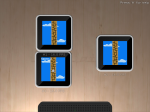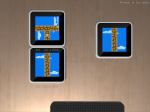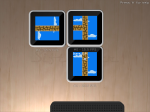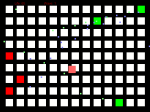A few weeks ago I, along with two friends of mine, Timotei (which you might remember from Shade) and his brother Sami took part in one of the few game jams organized in Romania. To be more specific, it was an Ubisoft (photos here) game jam which happened in Bucharest. This was actually my first jam (the kind where I go somewhere and work with other people on something), so it was quite exciting. We had 27 hours to make a game based on the theme “Embrace the random”, so we came up with a 2-player tug of war game.
Whisp showdown
As I’ve mentioned before, the game is basically a tug of war between two whisps. The whisps fight over an offering which they have to deliver to their respective gods (à la Nidhogg). The twist is that each whisp gets 3 random powerups, but they don’t know what they are, so every time you use one anything can happen.
Download
whisps.zip (6.5 mb)
Instructions
As a whisp, get the offering to your god. The blue whisp goes right and the red whisp goes left. If you hold the offering too long without moving to another screen, you’ll drop it and won’t be able to pick it up for a while.
Controls
Attention! The game is played with a keyboard and a gamepad (an X-Box 360 controller for Windows)
Player 1 (keyboard):
Move: Left / Right
Jump: Z
Use powerup: X
Player 2 (gamepad):
Move: Left thumbstick
Jump: A
Use powerup: X
Troubleshooting
If you have problems getting the game to run I’d suggest installing the newest XNA 4.0 redistributable and making sure you have .net framework 4 installed.
Credits
Game design, code & art made by Alin Baciu, Timotei Dolean & Samuel Dolean
Music:
The Dongas Tribe (and friends) – Farewell to Erin (https://archive.org/details/rainy_night_in_the_bell_tent)
Sfx:
Freesound.org
Explosion animation:
Explosion generator 3
Peace
🙂











